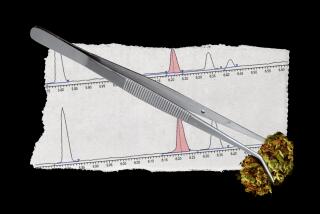New Sunscreen Test May End Animal Testing
IRVINE — InVitro International Inc. said Tuesday that independent research shows that its latest test for evaluating the effectiveness of sunscreens is 93% accurate. The test is meant to complement and in some cases supplant the use of animals in evaluating sunscreens.
The product-testing unit of San Francisco’s Shaklee U.S. Inc. did the first independent research on Suntex recently and found that it agreed with human test results 93% of the time.
Now, when a manufacturer wants to test how well a sunscreen works and assign it a number for SPF--sun protectant factor--it uses tests on both animals and--as required by the federal Food and Drug Administration--on humans.
But animal testing for products such as cosmetics and sunscreen is increasingly controversial, especially in Europe, since it often kills the animal. Shaklee’s policy is not to use animals in product research.
The Suntex test instead uses a dot of material sensitive to ultraviolet light and places it under a membrane similar to human skin that is covered with sunscreen. The efficiency of the sunscreen can be measured by how much the dot changes color after it’s subjected to UV light for several hours.
InVitro has another test it says is even more accurate, called Solatex, that the company hopes--with FDA approval--may replace sunscreen testing on humans.
Unlike animal testing, human testing is--of course--not life-threatening, but is expensive.
For instance, says InVitro, a human test--painting sunscreen on someone’s arm and holding it under UV light for an hour--costs $2,500 to $3,000 because the company has to pay a good deal of money to at least five people with different skin types for each test, says Shaklee.
The cost for a Suntex test is about $40. The cost for a Solatex test is $250. Replacing human testing completely would require FDA approval.
The results of the Suntex evaluation by Shaklee, a maker of nutritional, household and personal care products, is a bit of good news for InVitro, which has been battered by slow sales and resulting money problems.
Irvine-based InVitro--with $1.4 million in sales in 1992 and a $5.1-million loss--shook up its board of directors and arranged for a cash infusion of as much as $2 million a few months ago.
More to Read
Inside the business of entertainment
The Wide Shot brings you news, analysis and insights on everything from streaming wars to production — and what it all means for the future.
You may occasionally receive promotional content from the Los Angeles Times.









